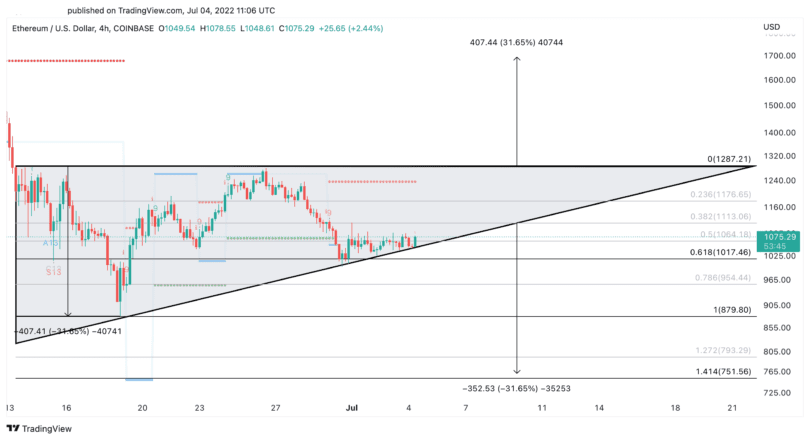Key Takeaways
- Bitcoin plummeted by 56% in Q2 2022.
- Meanwhile, Ethereum had a negative quarterly performance of 67%.
- Low trading volumes and open interest point to further losses in Q3 2022.
Share this article
Bitcoin’s status as a hedging asset was called into question in Q2 2022 after it suffered a steep drop in tandem with global financial markets. Ethereum has performed worse than Bitcoin with liquidity drying up across all major cryptocurrency exchanges.
Low Liquidity Ahead of Q3 2022
Bitcoin and Ethereum could be poised for further losses over the next quarter of the year.
The top two crypto assets closed Q2 2022 in a negative posture amid a decline in interest in the market and a worsening macroeconomic environment. Bitcoin incurred a quarter-to-quarter loss of over 56%, while Ethereum dropped by more than 67%. The Federal Reserve has committed to hiking interest rates and tightening measures to curb inflation this year, which has hit risk-on assets like crypto hard. Moreover, economists have warned that a global recession could be on the horizon, sparking fears among investors.
Although the downtrend for Bitcoin and Ethereum was steep in Q2, trading history suggests that both assets could accelerate their losses over the next three months. In the crypto bear markets of 2011, 2014, and 2018, Bitcoin respectively dropped by 68%, 40%, and 2.8% in the third quarter of the year.
A recent drop in trading volumes and open interest across crypto derivatives exchanges also hints that the market could face further pain ahead. Futures trading volumes on the top crypto exchanges peaked at a high of $481.7 billion in May 2021. Since then, the volume has posted a series of lower highs. The most recent spike occurred on Jun. 14 when roughly $270.7 billion worth of derivatives were traded in a day. Today, trading volumes are hovering at $57.2 billion, hinting at low liquidity and interest for Bitcoin and the broader cryptocurrency market.

Likewise, open interest in Bitcoin is trending downwards, indicating that traders are closing their futures positions. This metric highlights the number of open long and short BTC positions on crypto derivatives exchanges. If open interest continues to dip lower, that could signal that money is flowing out of the market, potentially leading to a steep correction.

Bitcoin and Ethereum Remain Stagnant
While several data points indicate that Bitcoin and Ethereum could drop, both cryptocurrencies are showing ambiguity from a technical perspective.
BTC appears to be consolidating within a symmetrical triangle that has developed on its four-hour chart. As it approaches the pattern’s apex, the probability of a significant price movement increases. The height of the triangle’s Y-axis suggests that the top cryptocurrency is bound for a 24.6% move upon the breach of the $20,900 resistance or the $18,660 support level.

ETH also looks like it’s consolidating within an ascending triangle that has begun to develop on its four-hour chart. The technical formation suggests that a sustained close below $1,020 could result in a downswing toward $750. However, based on the chart pattern, if ETH can overcome the $1,290 resistance level, it could surge to $1,700.

Given the ambiguous outlook that Bitcoin and Ethereum currently present, how the next quarter could play out remains unclear. Although the odds appear to favor the bears, the high volatility in the crypto market could trigger a brief bullish breakout ahead of lower lows.
Disclosure: At the time of writing, the author of this feature owned BTC and ETH.
For more key market trends, subscribe to our YouTube channel and get weekly updates from our lead bitcoin analyst Nathan Batchelor.
